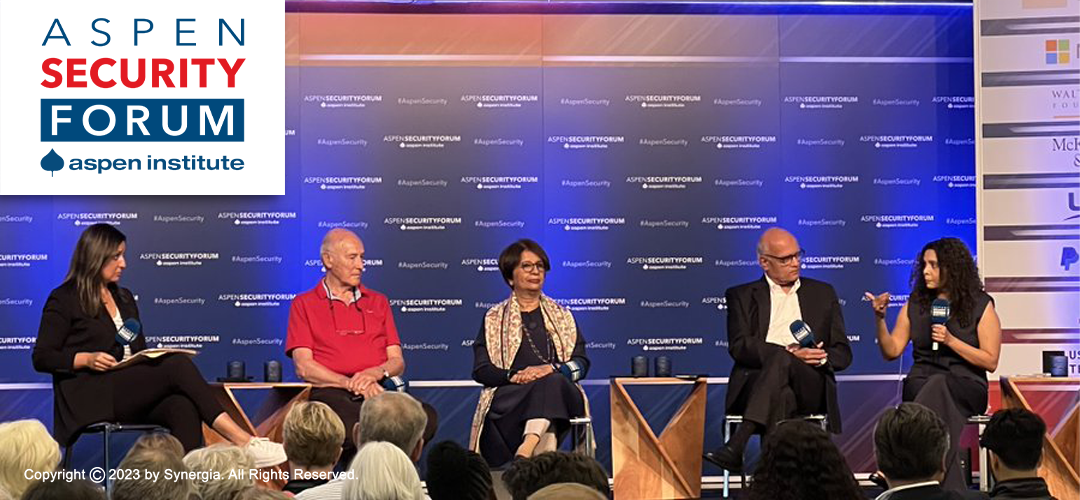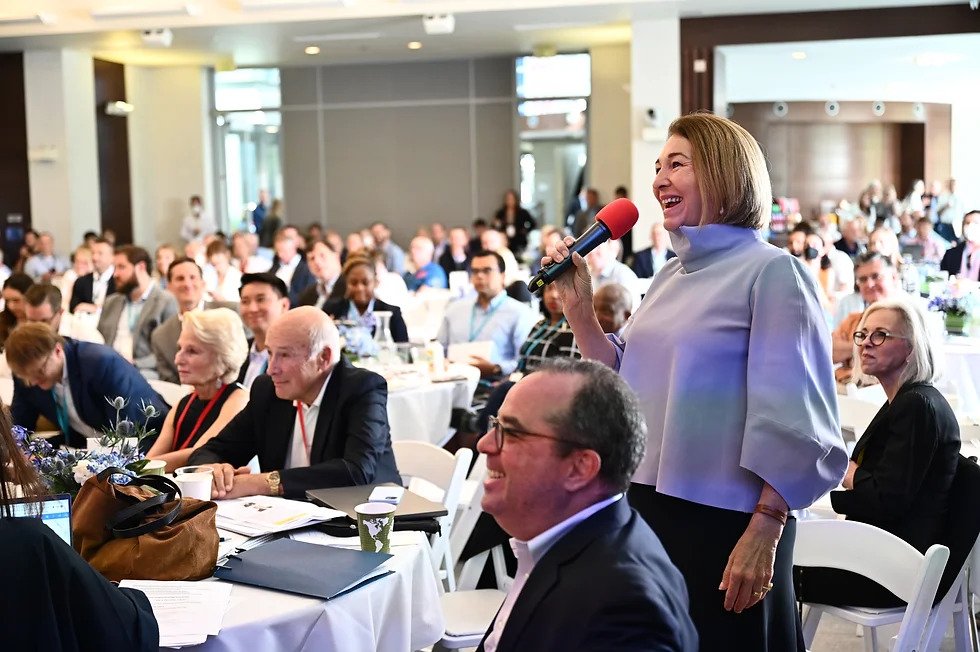Aspen Security Forum 2023
August 5, 2023 | Expert Insights

The American foreign policy has a ripple effect around the globe, and it is, for this reason, nations, big and small, rich and poor, invest in maintaining a lobby group in Washington, close to Capitol Hill. American Presidents have recognised this, and many have gained electoral victories at home due to their perceived brilliance in American ventures overseas.
Background
Over the years, American foreign policy no longer remains unchartered but has established well-recognised waypoints with bipartisan acceptance. Creating and hardening this policy are a host of think tanks that have gained immense influence over the decades. A strong think tank culture has developed in the U.S., bringing together academics and professionals from all segments of the foreign policy domain.
At the end of the cold war, as the existential threat to the U.S., and the 'free world' vanished, partisan divisions on foreign policy grew. This was met by creating an overarching forum in the shape of the Aspen Security Forum in 1984. Today, the Aspen Security Forum (ASF) is considered the premier national security and foreign policy platform, providing a nonpartisan public venue for domestic and global leaders to discuss the key national security and foreign policy issues of the day. There are enough experts within and outside the U.S. foreign policy establishment to deal with these issues.
The most recent edition was concluded in the last week of July.
Analysis
Today America faces a multitude of foreign policy challenges, and it is amply clear to its strategists that the U.S. cannot solve all the present-day problems of the world through a silo-based approach. A broadening of the horizons is required.
This is where multi-disciplinarity comes in. Having specialists in a few fixed areas is not going to work anymore. Just depending on the analysis of select think tanks will also not be sufficient. What is required is a rapid overhaul of the whole mindset in which foreign policy is formulated. Only then can present challenges be dealt with and future threats be correctly predicted.
First, there are the traditional foreign policy issues. This includes how to deal with China and Russia, resolving conflict in the West Asian region and strengthening the collective security of Europe. All these issues are long-standing and were discussed at the recent forum.
In the case of Russia, the outbreak of the Russia-Ukraine war has added a new twist to the tale. Naturally, the President of Ukraine had a virtual conversation at the forum. The American view was that as long as President Putin believed he could outlast Ukraine and its Western supporters, no meaningful talks could occur. "It’s vitally important that we disabuse him of that notion,” said Mr Blinken in one of the interactions.
China’s increased aggressiveness is a cause for concern. The Taiwan issue could flare up. China received special attention, with the topic of discussion being whether the U.S. is getting the challenge from Beijing right and, if not, what to do about it. One aspect of the growing challenge from China (and Russia) is cyberspace, which is increasingly being used to deliver cyber-attacks. With the Western civilisation 'living in cyberspace' (almost 95 per cent of the U.S. government business is conducted in the unsecured net), this poses the biggest challenge. Such attacks make it difficult to draw redlines that will be taken as an attack on sovereignty, thus making deterrence difficult.
North Korea remains high on the list of potential flashpoints in the world. Secretary of State Antony Blinken expressed the frustration of the Biden Administration in dealing with Pyongyang when he said," We made it clear going back to early in this administration that we were prepared to have negotiations with North Korea on the nuclear program with no preconditions. We sent that message several times. Here’s the response we got: one missile launch after another!" One positive fallout from this has been, especially for the U.S., that the alliance with Japan and South Korea has grown "even stronger, even deeper," to deter any aggression (including use of nuclear weapons) emanating from North of the 38th parallel. In fact, the U.S. is in conversation with the Chinese on China's role in bringing North Korea for negotiations on its nuclear programme and ultimately in the denuclearisation of the Korean Peninsula.
In West Asia, Israel is following an increasingly aggressive policy towards the Palestinians as well as domestically while at the same time building up relationships with like-minded Arab states.
The second set of issues concerns the up-and-coming problems. Top of the list is the emerging confrontation between international democracies and autocracies, as the U.S. looks at it. There is growing competition in the Arctic North between the great powers. Other than this, there are the varied geo-strategic implications of the new emerging artificial intelligence technology. Then there is the new space race with both exploratory and security components.
Democracy promotion was analysed under the heading of “The Global Democracy Agenda”. This is a pet issue for the Biden administration. It has hosted a Global Democracy Summit. This gives it a stick to beat both Russia and China.
A new Great Game is emerging in the Arctic North. There are many untapped resources in this part of the world. For most of history, it has been mostly unexplored. But this is now changing. Even a country that is far away from the Arctic region is taking part in this competition. The start of the Russia-Ukraine war has stopped direct communications between the U.S. and Russia in the Arctic region. This has grave security implications for both sides.
Artificial intelligence is still an evolving field. There are many unknowns. However, the geopolitical implications of this novel technology are quite clear. The standard method of conducting warfare is going to change significantly. The human factor will be slowly removed from this process. This will make war more efficient. At the same time, it will make combat more uncertain. Artificial intelligence also has substantial economic implications. There is a global scramble to become the leader in artificial intelligence. The winner in this race could have a major advantage over other rivals.
The space race is not a new phenomenon. Today the stakes are much higher than that. First, the number of players in this arena has increased considerably from what it was before. This includes both countries and large private corporations. Space technology has grown by leaps and bounds. Dominance in space has both military and economic implications. For this purpose, the Trump administration created a separate Space Force branch for the U.S. military. Resource-wise, the Moon is filled with natural riches. These are mostly still unexploited. There is a possibility that Mars might also prove to be a treasure trove in this regard. So, the U.S. cannot afford to fall behind its near competitors in this area. Hence this session was aptly titled “Final Frontier: Space Strategy for the Future”.
An emerging issue with which the world is concerned is the acquisition of critical mineral resources. This has a number of implications. First, there is the national security side of things. Critical new technologies depend on rare minerals found on the Earth's surface for their manufacturing. These technologies have both military and non-military applications. The countries which hold these valuable natural resources are mostly war-torn and poor. So, a new kind of imperialism is at play here. For countries like the U.S. however, it is mostly about national security. Hence the session to discuss this event was appropriately named “Between a Rock and a Hard Place: Critical Minerals and National Security”.
Other than this, the importance of semiconductor technology was also discussed in this forum. Taiwan is a major manufacturer of semiconductors. With rising tensions in the Taiwan Straits, there is a possibility of disruption in the global supply chain of this crucial component. This will have a devastating impact on the U.S. economy as well as the U.S. military. In this context, the session scrutinising this issue was titled “Semiconductors and National Security: The CHIPS Challenge”. Amid all these high-profile talks, the forum did not forget the past mistakes of the United States with respect to the failed war in Afghanistan. Ahmad Massoud, the leader of the opposition National Resistance Front of Afghanistan, was invited virtually. He has very little chance of overthrowing the Taliban regime at the moment. But these non-official engagements with him are still necessary. They show that the world has not forgotten about the anti-Taliban forces in Afghanistan. Overall, the forum this year has been a huge success. A follow-up forum will be held at the end of this year in Washington DC, which will carry on from here.

The Indian Factor
Apart from this there are many other things on the international agenda. One of this the emergence of India as a power to reckon with in its own right. This has confounded Western policymakers. While India has a Western-style democratic system of governance, it is still not aligned with the West on a number of key issues. Human rights in India are supposedly a big concern for Western interlocutors. They cannot place India in either the Western or the anti-Western camp. And this creates complications in formulating a clear policy towards this large country.
The ongoing Russia-Ukraine war has laid open the West’s conundrum towards India. The slogan of this being a struggle between democracy and authoritarianism has not caught any traction in New Delhi. The West has got to stop looking at India from its own parochial policy framework. The rise of India is a historical inevitability that will ultimately benefit the whole world. Everyone should welcome such a rise. The West, of course, needs India in its struggle against China.
On the other hand,, India has not received much assistance from the West in its border conflict with China. Carrying negative human rights stories in foreign media will not do the trick in bringing down this country. The title of the session on India was “Inflection Point: India and the Changing World Order”. The panellists in this session were quite mixed. One of these was Rana Ayyub of the Washington Post, who took an openly aggressive stance against the present Indian dispensation. Other than this, there were the former Indian diplomats Shivshankar Menon and Nirupama Rao.
Assessment
- Many issues which seriously concern the rest of the world have been sidelined. This includes climate change.
- The list of topics covered in this forum makes one thing quite clear. In an ever-complicated world, the U.S. can no longer "talk and walk" on its own. It needs the support of the global community.
- That India was discussed shows that New Delhi is important for Washington one way or the other. Both the perspective of the Indian establishment and the Western viewpoint of India were heard.








Comments